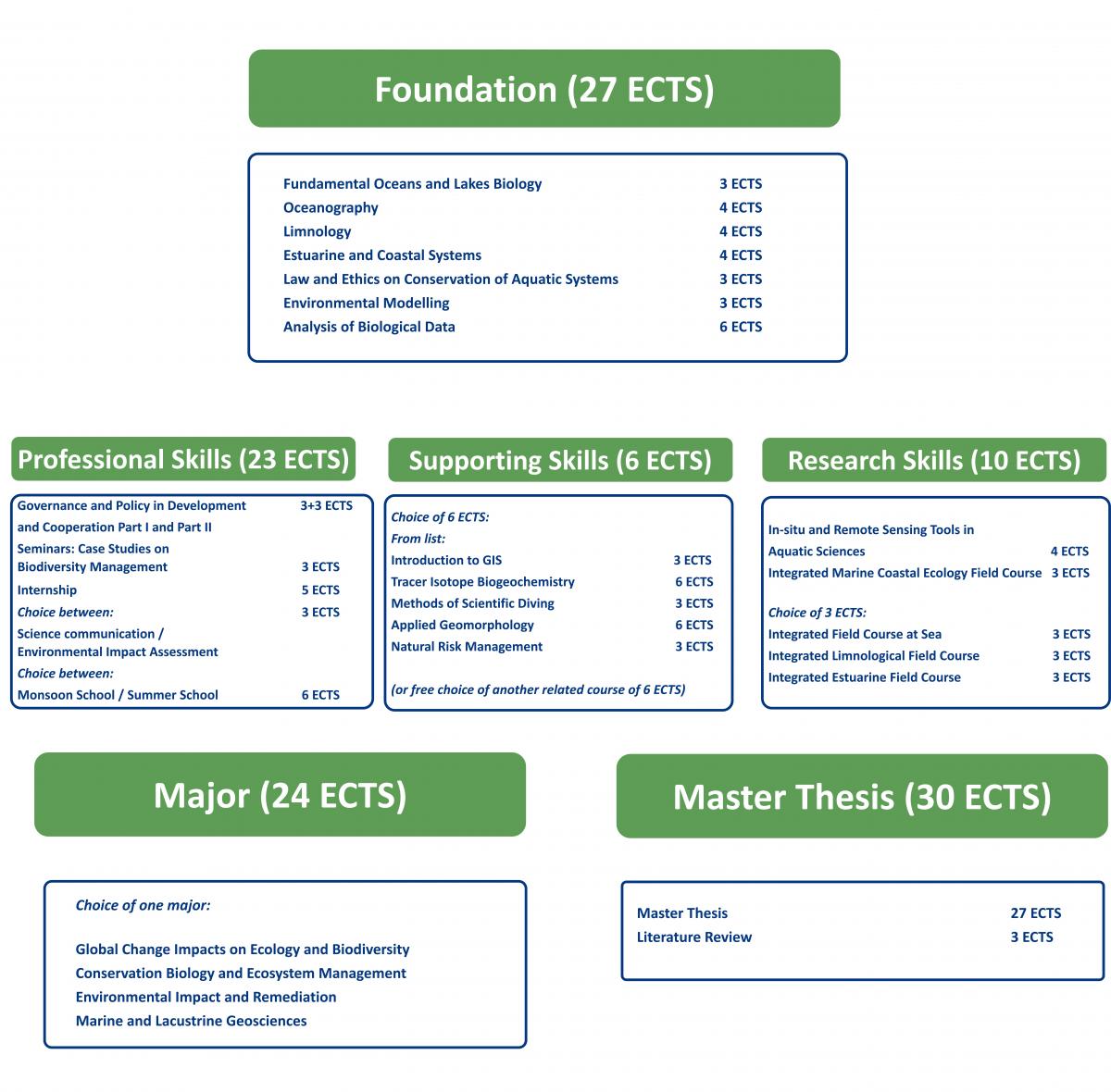Programme structure - master Oceans & Lakes
Enrolments as of 2023-2024

 Composing your study programme
Composing your study programme
You can find a guide on how to compose your study programme in the new programme here:
-enrolments as of 23-24
-enrolments as of 25-26
Programme overview
The full programme overview can also be found on the VUB website.
Foundation courses
From the courses listed below, students must take up all 27 ECTS:
- Fundamental Oceans and Lakes Biology (3 ECTS)
- Oceanography (4 ECTS)
- Limnology (4 ECTS)
- Estuarine and coastal systems (4 ECTS)
- Law and Ethics on Conservation of Aquatic Systems (3 ECTS)
- Environmental modelling (3 ECTS)
- Analysis of Biological Data (6 ECTS)
Toolbox professional skills
From the courses listed below, students must take up 23 ECTS:
Compulsory:
- Governance and Policy in Development and Cooperation Part 1 (3 ECTS)
- Governance and Policy in Development and Cooperation Part 2 (3 ECTS)
- Seminars: Case Studies on Biodiversity Management (3 ECTS)
- Internship (5 ECTS or 11 ECTS)*
Choice between:
- Environmental Impact Assessment (3 ECTS)
- Science Communication (3 ECTS) (not available in 2025-2026)
- Free elective course (1x3 ECTS) - choice must be approved by head of exam commission. To ask approval, fill out this form by the deadline. A course of 3 ECTS from the list 'Toolbox supporting skills' can also be taken.
Choice between:
* Internship of 11 ECTS is only possible if a student does not take up Monsoon School or Summer School
** Monsoon School is mandatory for VLIR-UOS scholars
Toolbox supporting skills
From the courses listed below, students must take up 6 ECTS:
- Introduction to GIS (3 ECTS)
- Methods of Scientific Diving (3 ECTS)
- Tracer Isotope Biogeochemistry (6 ECTS)
- Applied Geomorphology (6 ECTS)
- Natural Risk Management (3 ECTS)
- Free elective courses (2x3 ECTS or 1x6 ECTS) - choice must be approved by head of exam commission. To ask approval, fill out this form by the deadline.
Toolbox research skills
From the courses listed below, students must take up 10 ECTS:
Compulsory:
- Integrated Marine Coastal Ecology Field Course – 3 ECTS
- In-situ and remote sensing tools in aquatic sciences – 4 ECTS
Choice between*:
- Integrated Field Course at Sea – 3 ECTS
- Integrated Limnological Field Course – 3 ECTS
- Integrated Estuarine Field Course – 3 ECTS
*Selection through motivation letter might be possible
Specialisation: major
Students pick one major. You can only choose the major 4 'Marine and Lacustrine Geosciences' if you have a Bachelor of Science in Geology.
From the courses listed below per major, students must take up 24 ECTS:
Major 1 Global Change Impacts on Ecology and Biodiversity
- Aquatic Food Web Ecology (4 ECTS)
- Marine Extreme Systems (4 ECTS)
- Lacustrine Systems (4 ECTS)
- Aquatic Microbial Ecology (6 ECTS)
- Aquatic Genomics (6 ECTS)
Major 2 Conservation Biology and Ecosystem Management
- Marine fisheries management (3 ECTS)
- Integrated Coastal Zone Management (6 ECTS)
- Law of the Sea and Protection of Oceans (3 ECTS)
- Conservation Genetics (3 ECTS)
- Freshwater ecology and management (6 ECTS)
- Free elective course (1x3 ECTS) - choice must be approved by head of exam commission. To ask approval, fill out this form by the deadline.
Major 3 Environmental Impact and Remediation
- Aquatic Ecotoxicology and Environmental Monitoring (6 ECTS)
- Ecosystem Based Adaptation to Global Change (6 ECTS)
- Global Change Physiology (6 ECTS)
- Integrated Practicals (3 ECTS)
- Freshwater Ecosystem Functioning (3 ECTS)
Major 4 Marine and Lacustrine Geosciences
To enter into this major, you need to have a BSc in Geology
As of 2025-2026, this major will not be offered anymore to new students.
- Advanced Sedimentology (6 ECTS)
- Micropaleontology and Paleo-environmental reconstruction (6 ECTS)
- Integrated Offshore Exploration (6 ECTS)
- Paleoclimatology and Climate Change (6 ECTS)
Specialisation: master thesis



